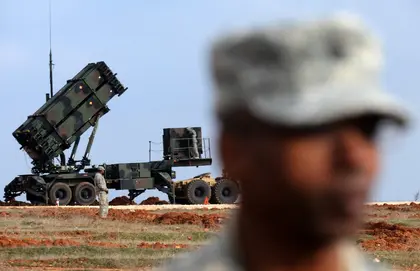The biggest ticket item in Washington’s latest tranche of arms to be sent to Kyiv is a high-tech (and extremely expensive) Patriot anti-aircraft missile system. But buried elsewhere in the Pentagon’s December military goodies list are plenty of trimmings and fixings for a beefy renewed Armed Forces of Ukraine (AFU) ground offensive.
A newly produced Patriot battery and its ammunition is capable of creating a hemisphere of air space 80 kilometers in diameter, in which practically all Russian aircraft and most Russian missiles would get shot down. It usually costs the American taxpayer one billion dollars. The total value of the Pentagon’s Dec. 21 announced assistance package to Ukraine is $1.85 billion:
JOIN US ON TELEGRAM
Follow our coverage of the war on the @Kyivpost_official.
But Patriots aside, the rest of the American gift list seems almost tailor-made to making the AFU’s next big push against the Russian army more lethal and devastating.
Ammunition for Kyiv’s artillery – by far the dominant weapon in the Russo-Ukraine war, and without which advance is impossible – is extravagantly provided. Both sides, in recent months, have complained of shell shortages, but once the December package arrives, the Ukrainians will have ammo to burn for about two months: 100,000 tank main gun rounds, 50,000 artillery rockets and 75,000 large-caliber artillery and mortar rounds.
Critically, all those munitions are for Soviet cannon and artillery systems. In past arms deliveries, the U.S. focused on sending the AFU ammo for NATO-standard artillery pieces, particularly the 155mm howitzer.

Drone Wars –Technology, Tactics, Strategy, Countermeasures, Legislation
According to the Pentagon announcement, funding for the arms package will come from a $1 billion draw-down from existing U.S. stocks (very close to the market value of a single Patriot system) and $850 million from the Ukraine Security Assistance Initiative (USAI) law, which allows the U.S. government to locate and purchase military hardware for Ukraine from commercial vendors.
The U.S. does not manufacture Soviet-standard 152mm howitzer ammunition, a shell the AFU is desperately short of and America never produced. A few small-scale exceptions aside, the December arms package marks the first time the U.S. has committed to sending Ukraine Soviet-standard artillery ammunition in big volumes, effectively by allowing U.S. government buyers to contract for large quantities of shells from manufacturers in places like Slovakia and Bulgaria, where the 152mm caliber is still manufactured.
Precision-guided munitions are something the U.S. does produce in great quantity, and which the Ukrainians have in the past used deftly against Russian rear area command and logistics targets prior to big offensives. Unspecified numbers of rockets for the deadly HIMARS artillery system, accurate to a meter at a range of 80 kilometers, HARMS missiles specifically designed to hunt down Russian air defense radars and blow them up, and 500 GPS-guided Excalibur howitzer shells able to annihilate any tank in the Russian fleet with an aimed hit to the turret, all are on the December list.
By the time Ukraine launched its successful Kharkiv and Kherson offensives, in September and October respectively, Kremlin defenses were near collapse. Weeks of Ukrainian strikes with American-made precision-guided weapons munitions blew up Russian ammo dumps, dropped bridges needed for retreat, and destroyed command headquarters – in some cases entire army staffs.
In past arms shipments, the delay from announcement to field use took, on average, somewhere between several weeks and a few months. With the December arms package the time gap between commitment in Washington to explosion on a Ukrainian battlefield might be faster or slower, depending on how quickly Pentagon arms purchasers can find and ship the Soviet-caliber ammunition Washington just promised Kyiv. Likewise, the number of HARMS missiles and HIMARS rockets sent by the Americans in the next several weeks will determine how powerful the next AFU offensive will be.
You can also highlight the text and press Ctrl + Enter






